CBS News
Cucumbers linked to salmonella outbreak that has spread to 25 states

A salmonella outbreak linked to cucumbers has expanded to 25 U.S. states and the District of Columbia, with at least 162 people having fallen ill and 54 hospitalized, health officials announced on Wednesday.
Federal and state agencies are investigating the outbreak following data showing that cucumbers may be contaminated with salmonella, the Centers for Disease Control and Prevention said in a public post. Testing that identified salmonella in a Fresh Start Produce product sample prompted the recall two days ago of cucumbers shipped to 14 states.
Testing is still underway to establish a definitive link, according to the agency. Salmonella can cause serious and sometimes fatal infections in the young, frail or elderly. Healthy people infected with salmonella can experience symptoms including fever, diarrhea, nausea, vomiting and abdominal pain. In rare circumstances, the bacteria can get into the bloodstream and cause more severe infections.
Illnesses linked to the outbreak started o March 11 continued through mid-May, according to the CDC. Those impacted live in the District of Columbia and the following states: Alabama, Arkansas, Connecticut, Florida, Georgia, Idaho, Indiana, Kentucky, Maine, Maryland, Massachusetts, Michigan, Minnesota, Missouri, New Jersey, New York, North Carolina, Ohio, Pennsylvania, Rhode Island, South Carolina, Tennessee, Texas, Virginia and West Virginia.
Salmonella bacteria cause about 1.3 million infections, 26,500 hospitalizations and 420 deaths in the U.S. every year, with food causing most of the illnesses, according to the CDC. Anyone with severe salmonella symptoms should call their health care provider. Most people recover without specific treatment and should not take antibiotics, the agency noted.
The agency urged consumers not to eat any of the recalled cucumbers and to wash any items or surfaces that may have touched a recalled cucumber with hot soapy water or a dishwasher.
“If you recently purchased cucumbers and have them at home, you can check with the store where you purchased them to see if they were part of the recall. If you can’t tell, do not eat them,” the CDC said.
CBS News
Video shows freight train derailing after crashing into tractor-trailer in Texas

Watch CBS News
Be the first to know
Get browser notifications for breaking news, live events, and exclusive reporting.
CBS News
CEO shooting suspect Luigi Mangione arrives in New York after waiving extradition in Pennsylvania

Watch CBS News
Be the first to know
Get browser notifications for breaking news, live events, and exclusive reporting.
CBS News
“Sleepmaxxing” trend has young adults optimizing their sleep. Experts share some do’s and don’ts.

How to get an ideal night of sleep has been trending on social media. It’s called sleep optimization, or “sleepmaxxing,” and it’s particularly popular among younger Americans.
From using sleep trackers to sleeping with mouth tape, social media users are sharing tips online for what they do to catch more Z’s — and millions of people are paying attention.
Kamila Charles, a college senior in Florida, is among the many young adults who are now prioritizing their sleep routine.
“Magnesium, I do my skin care, I put my hair in rollers,” she said of her nightly rituals. “I’m trying to figure out what works for me because it is hard.”
Another student, Craig James, told CBS News he makes sure his room is dark, quiet and cold for optimal sleep. “No television on, no nothing,” he said. Many sleep experts echo that advice.
One recent analysis found members of Gen-Z spend more time sleeping than any other generation. That same survey showed they also spent more time exercising and prioritizing self-care than others.
“They just want to make the quality better, which is a good thing,” Dr. Rafael Pelayo, a clinical professor at Stanford University’s Sleep Medicine division, told CBS News. “Even though they may be considered good sleepers overall, they want to make their sleep even better.”
A recent Gallup survey found a majority of Americans — 57% — said they would feel better if they got more sleep.
The American Academy of Sleep Medicine recommends 7 to 8 hours of sleep per night, though it depends on age and other factors.
Middle schoolers should get about 9 to 12 hours a night, high schoolers about 8 to 10 hours, and adults more than 7 hours, Dr. Nidhi Kumar recently told CBS News New York.
“How many high schoolers are really sleeping that much?” Kumar said. “We are a country that is chronically sleep deprived.”
Sleep scientist Vanessa Hill recently told CBS News the sleepmaxxing trend may be beneficial because it gets people thinking about their sleep.
“So I think overall, it’s good,” she said, but warned, “sometimes when people can be too perfectionistic about their sleep, it can backfire.”
Risks of the sleepmaxxing trend
Despite the wellness intentions, experts say some aspects of this trend could do more harm than good.
“A lot of the things people do are not necessarily evidence-based,” Pelayo said. He also warns against obsessing over smartphone sleep trackers.
Kumar agrees, saying the problem with tracking your sleep is it can become obsessive.
“People can actually start dealing with an anxiety about trying to get to sleep,” she said.
She also says people should avoid mouth taping, a practice many have seen on social media.
“I’m going to say a hard no to mouth taping. It can actually be quite dangerous. It can increase snoring. It can cause anxiety, suffocation. It can cause a reduction in oxygen levels in certain susceptible individuals,” she said.
Kumar advises against the many pills and potions being promoted online, but says two supplements can be useful.
“Certain forms of magnesium, magnesium threonate, crosses the blood brain barrier (and) can help with sleep,” she said. “And if you’re dealing with jet lag, melatonin can be helpful. Other than these two supplements, nothing else has really been shown to work.”
Benefits of better sleep
Sleepmaxxing is helping to repopularize certain aspects of good sleep hygiene that everyone should try to embrace, Hill said.
“Things like try not to use your devices for half an hour or so before bed. Try to stick to a consistent bedtime. Try to have a relaxing wind-down routine. All of these things can set us up for a good night’s sleep,” she said.
Improving sleep is a positive step for overall health.
Kumar said quality sleep can lead to fewer sick days because it boosts your immune system. It can also help you maintain better weight control and reduce your risk of other serious conditions.
“Lower rates of heart attack, stroke, diabetes and high blood pressure; better mood, better attention, less stress, less anxiety,” she said.
If you are having trouble with your sleep, it’s best to consult your doctor.
“TikTok is not the answer when you really do have a problem, and there are a lot of sleep problems out there,” Hill said.






